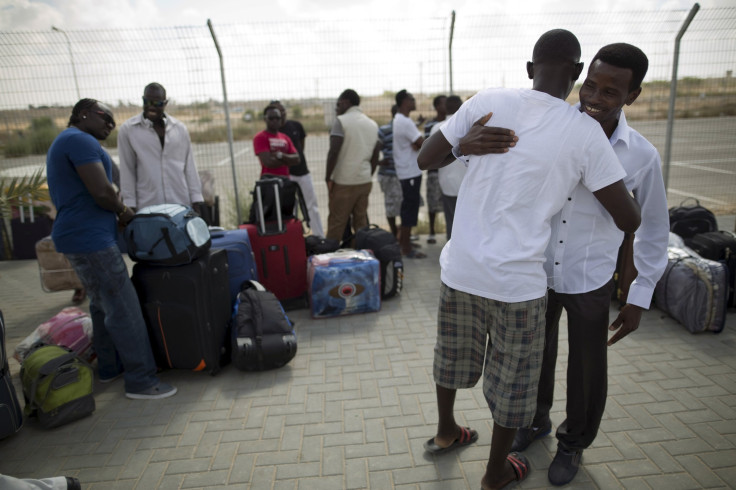Israel Immigration: No African Migrants In Arad, Mayor Says As Asylum Seekers Released From Detention

As Israel freed more than 1,000 African asylum seekers from a detention facility Tuesday, the mayor of at least one southern Israeli city wanted it to be known: Migrants are not welcome in his city. Mayor Nissan Ben Hamo expressed concern Tuesday on Facebook that "infiltrators" would make their way toward his small city of Arad.
“We have no concrete information at present about their possible arrival in Arad but we’re ready for any scenario,” he wrote, the Israeli newspaper Haaretz reported. “If we have to strengthen our struggle on this issue I won’t hesitate to call on all residents to join in the fight for the city’s well-being.”
The state began releasing 1,178 African asylum seekers Tuesday following a Supreme Court ruling last week that current laws allowing migrants to be held for as long as 20 months were “disproportionate.” The court ruled they should be held just 12 months maximum while the law was being revised, the Jewish Telegraphic Agency reported.
Fear among Arad's residents was apparently sparked after it was learned that asylum seekers would be prohibited from settling or working in Tel Aviv or the southern resort city of Eilat, two major hubs in Israel’s south. Arad’s mayor expressed fear that with migrants not allowed to settle in two cities with significant migrant communities, they would turn toward his city.
“I met the Interior Minister yesterday and expressed my displeasure at his decision to prefer one city over another -- I told him that I’m determined not to allow infiltrators to reach Arad,” he wrote.
The moment we all act in one accord with the Mayor of Arad in #Israel, in that instant humanity will cease to exist! https://t.co/TePfyOuk3A
— Brehane-meskel Araya (@brehane007) August 25, 2015Police have been instructed to boost their presence at entry points to the city, including at the central bus station, he added Tuesday. “I ask everyone to maintain alertness and report unusual incidents, but to leave us to handle the situation,” he wrote.
The issue of African asylum seekers in the country is a contentious one. More than 40,000 Eritreans and Sudanese are believed to have entered Israel, mostly illegally, in recent years. Israeli leaders allege many of them are economic migrants who could return home, but international law forbids deportations to countries where they may be at risk.
Israel has offered payment to Africans willing to return home and has ordered the detention of thousands in the Holot open detention facility. With the Tuesday and Wednesday release of asylum seekers from the facility, just 587 people are expected to remain by Wednesday night, Haaretz reported.
However, in the months to come, the facility is expected to fill up again.
© Copyright IBTimes 2024. All rights reserved.












